Betta fish are a popular pet for many aquarists, but it’s important to understand their behavior in order to create the best environment for them.
One of these behaviors is sleep; do betta fish need rest? It’s an interesting question that we’ll explore in this article.
The study of betta fish can help us learn more about ourselves and our own needs for restful sleep. By understanding how they rest and why, we can better serve our little finned friends by creating healthy conditions for them both during the day and at night.
In this article, we’ll look at what research tells us about betta fish sleep so you can provide your furry friend with all they need.
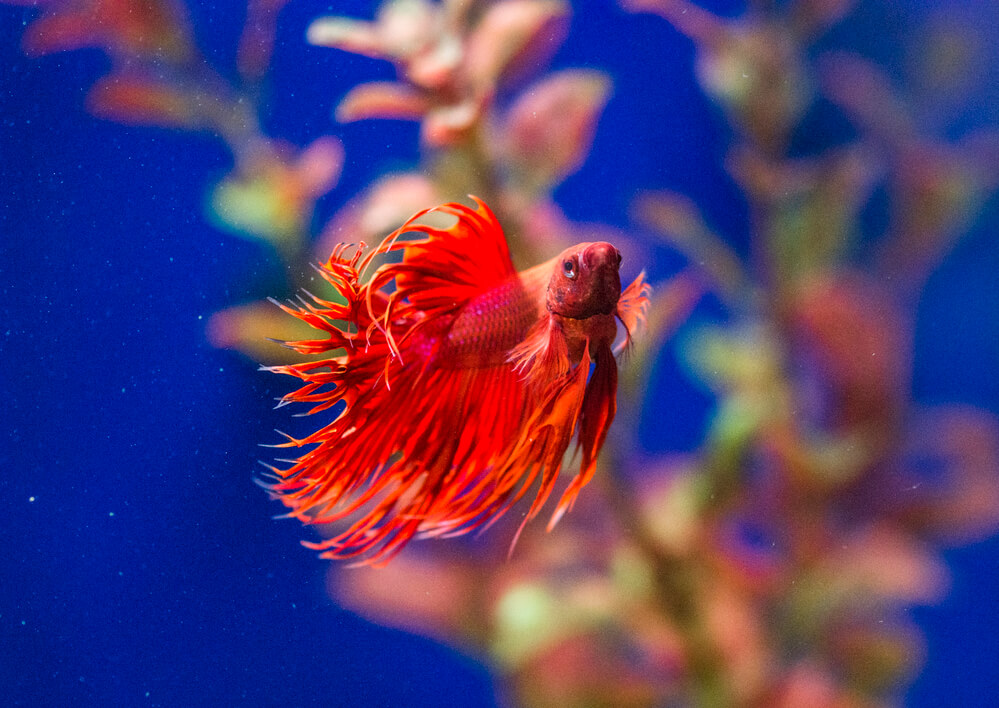
Do Betta Fish Sleep?
Yes, betta fish do sleep. They may appear to be constantly alert and aware of their environment, but like all other animals they need rest to survive.
When a betta is tired it will often stop moving around as much and can even become sluggish or unresponsive to stimuli. During this time the fish’s gills continue to move slowly in order to take in oxygen from the water.
The amount of time that a betta sleeps varies depending on its age, health, and environmental conditions. Generally speaking though, most healthy adult bettas tend to spend 4-6 hours sleeping at night when lights are out and activity levels are low. Younger fish may require more sleep while older ones less so.
It’s important for betta keepers to provide a comfortable and safe environment for their pets during the day and especially at night. This means making sure there aren’t any loud noises or bright lights that might disturb them while they’re trying to get some shut eye.
A well-maintained aquarium with plenty of hiding spots helps create an ideal sleeping space too!
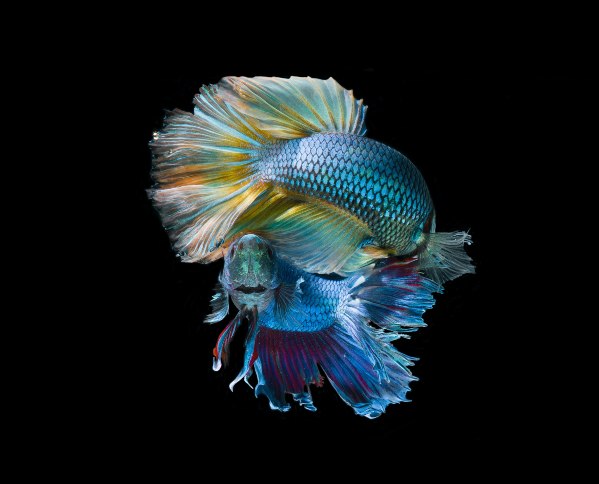
How Do Betta Fish Sleep?
Just like humans, betta fish require regular periods of rest in order to stay healthy and active. But how do these amazing creatures actually manage to get some shut-eye?
In the wild, betta fish generally stick to a very specific daily routine when it comes to sleeping. They will settle into an area of calm water during the early parts of the night, usually in shallow depths or near vegetation. This is believed to be beneficial because there are fewer predators present in those areas at night.
Betta fish have even been observed taking naps during the day if given the opportunity; however, this isn’t something that should become a habit since it disrupts their natural circadian rhythm.
It’s important for owners of pet betta fish to provide them with similar sleeping conditions as they would experience in nature in order to keep them healthy and happy. That means providing enough hiding places among plants or driftwood so they feel safe while resting.
It’s also recommended that aquarium lights be kept on a timer so your betta can enjoy dark hours each day which will mimic its natural environment more closely. With proper care and attention, you’ll soon discover just how peaceful your little buddy looks when it’s getting some much needed zzz’s!
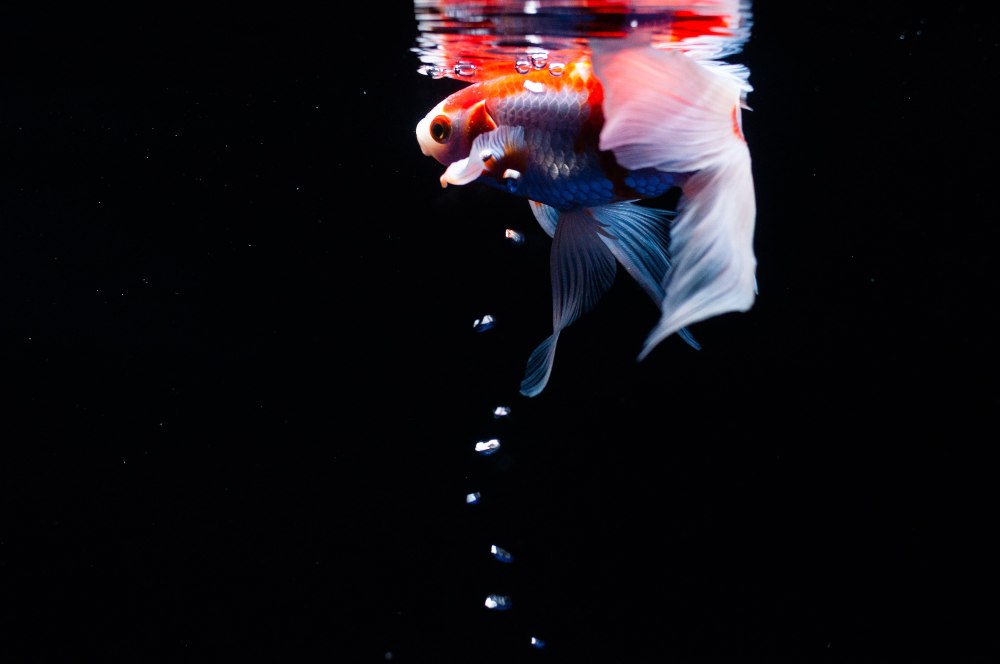
What Does Betta Fish Sleep Look Like?
Time seems to stand still when a betta fish is sleeping. You might find yourself wondering if the fish has dozed off into eternity, with its vibrant fins resting peacefully and its body lying motionless in the tank. But rest assured – bettas are just like us humans: they need their beauty sleep too!
The way that betta fish sleep looks surprisingly similar to how we slumber away our days. It’s as if they can be found dreaming of swimming down streams or soothingly fluttering around underwater foliage, all while tucked away comfortably under some aquatic plants.
During these moments, it’s not uncommon for bettas to experience something akin to R.E.M. (rapid eye movement) periods; their eyes may dart about beneath closed lids and their breathing rate will drop significantly as well.
Sleeping is an essential part of any creature’s life cycle – including those belonging to gilled friends such as the betta fish. So next time you observe your own pet snoozing away in his/her aquarium home, take comfort knowing that he/she is getting much needed R&R – because after all, even fishes deserve a good night’s rest!
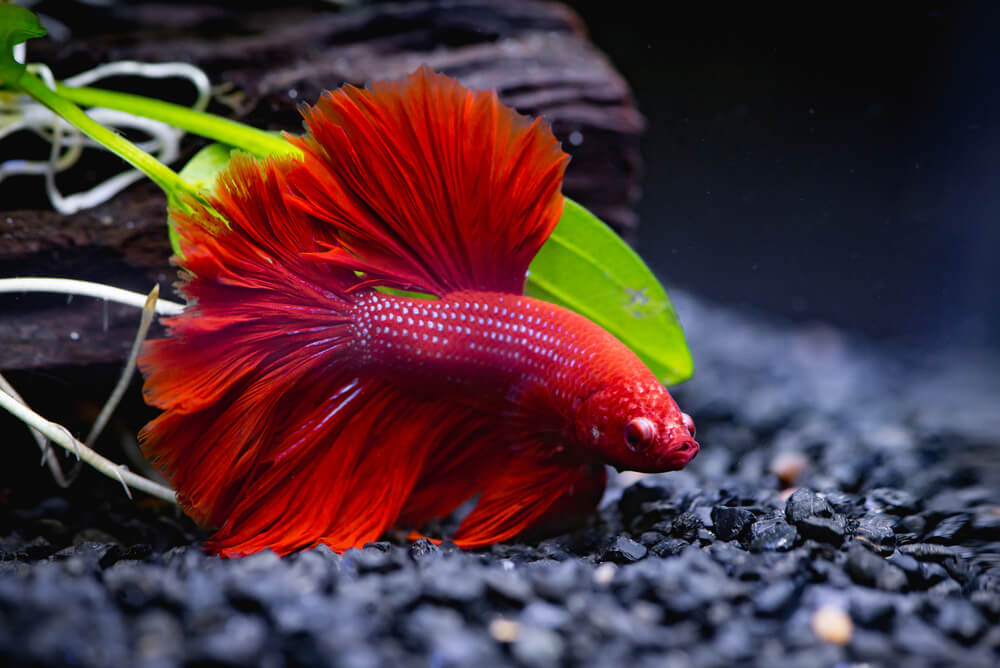
What Time Do Betta Fish Sleep?
- Betta fish usually sleep during the day, so it’s important to look out for signs that they are sleeping. These signs can include slowing down, staying still, or lying at the bottom of the tank.
- During the day, betta fish will usually take multiple short naps throughout.
- At night, it’s common for betta fish to take longer, deeper sleeps, often for several hours.
- If you notice your betta fish sleeping during the day, it’s best to avoid disturbing them or making too much noise.
However, you should try to ensure that the tank stays dark enough during the night so that your betta fish can rest comfortably.
Daytime Sleeping Habits
When the day is bright and full of life, these little swimmers can often be found in an odd state. From a distance, you may think they’re just lazily swimming around their tank – but take a closer look and you might notice that they’re actually snoozing!
Betta fish have been known to sleep during the daytime hours as well, especially when there’s plenty of shade available for them to cool off from the sun’s rays. They’ll rest peacefully at the bottom or near the surface of their habitats, even with other tank mates present.
It’s important to remember though that this doesn’t necessarily mean your betta has enough energy to explore any time soon; rather, it means they’re taking brief moments of respite throughout their day-to-day lives. So if you ever find yourself wondering what time do betta fish sleep? The answer is both night and day!
Nighttime Sleeping Habits
At night, the sleeping habits of betta fish become even more interesting. When darkness falls and their natural predators are out hunting, these fish will find a place to hide and rest for hours at a time. They may perch on plants or other objects in the tank, snuggling into crevices for safety or simply curling up at the bottom.
You might also notice them floating near the surface with their eyes closed – this is another way they choose to protect themselves from danger during sleep!
But what about those times when your betta seems particularly active? This can be because they’re just naturally curious creatures who love exploring their environment. Or it could mean that something has triggered an instinctive response; such as feeling threatened by sudden movements nearby or changes in water temperature.
In any case, it’s important to remember that while they enjoy having fun, they need proper rest too!
Proper nutrition and care play a key role in ensuring that your betta gets enough shut-eye. Make sure you’re providing them with plenty of hiding spots and keeping noise levels low so they don’t get startled awake.
Regularly monitoring water parameters should go without saying but if all else fails then turn off the lights – trust us, your little friend will thank you for it!
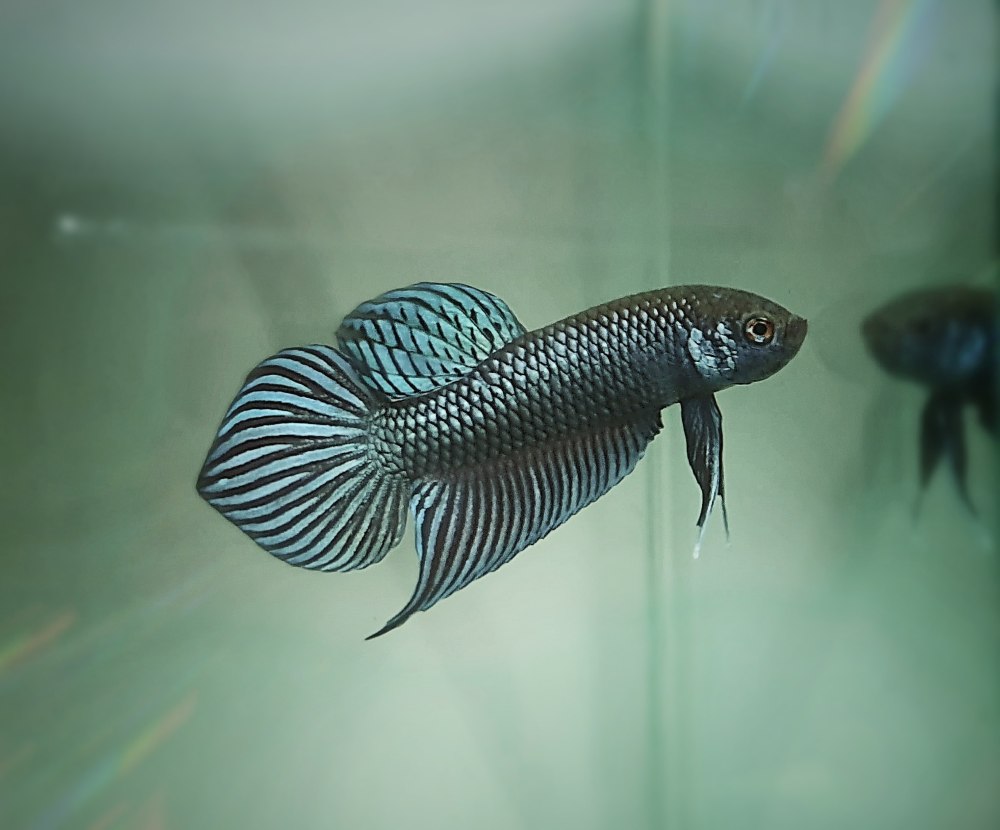
How Many Hours A Day Do Betta Fish Sleep?
Betta fish are known to be active, vibrant creatures that love to explore their environment. But it turns out they also need plenty of rest! Not only do betta fish require sleep, but how many hours a day they spend snoozing can vary greatly depending on the individual.
Most betta fish will end up sleeping for around eight to twelve hours per day in total. This is usually broken up into several smaller naps throughout the day and night rather than one long stretch of sleep. They’ll typically take these short rests at times when there isn’t much going on – such as in between periods of activity or after eating a big meal.
It’s important to remember that all animals have unique personalities so some bettas may choose to sleep more or less than others. It’s essential to observe your own pet carefully and provide them with an environment that encourages healthy resting habits.
Make sure you’re providing enough food, stimulation, and hiding spots so your little buddy has everything he needs for a good night’s sleep!
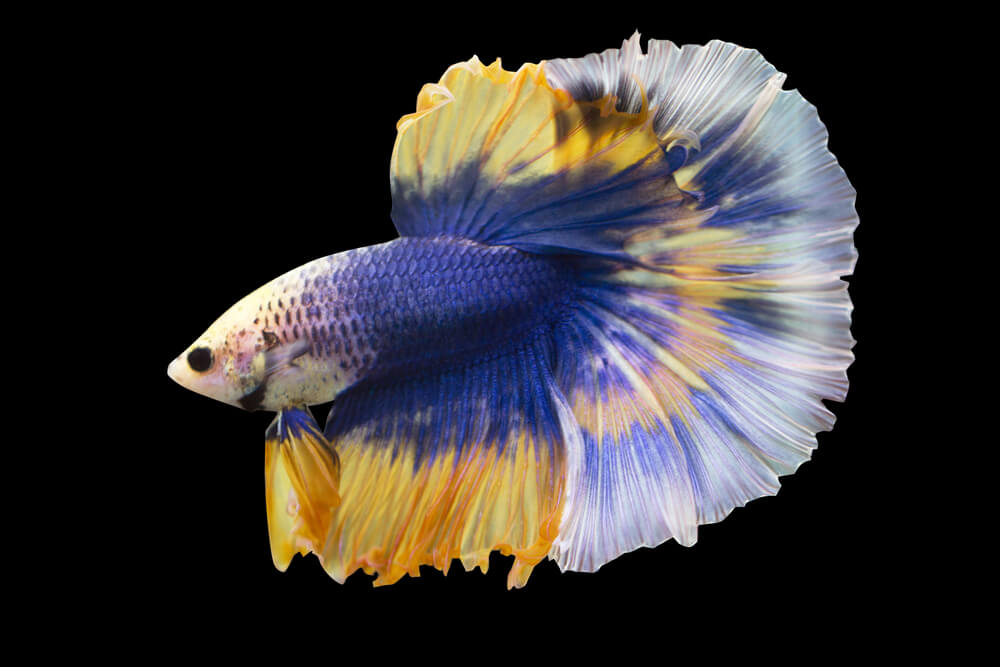
What Is The Impact Of Environment On Betta Fish Sleep?
The secrets of how betta fish sleep have long intrigued scientists and animal lovers alike. But what is even more mysterious, is the impact that environment has on a betta’s sleeping habits. Could their sleeping patterns be affected by changes in temperature or lighting? Research suggests that this may indeed be the case.
Betta fish are most active during daylight hours, when there’s plenty of light to help them see food and predators. However, as night falls, they tend to slow down and become less active; a sign that they’re getting ready to rest for the evening. They start slowing down before sunset, but it isn’t until around midnight that they actually settle into deeper sleep.
The comfort level of your betta also plays an important role in determining its sleep routine. If you keep your tank too hot or too cold, then your betta won’t feel comfortable enough to get a good night’s rest. Furthermore, if your home is particularly noisy or brightly lit at night then this might affect your betta’s ability to drift off peacefully – making sure your aquarium is located away from any potential disturbances could really help with this issue!
Ultimately, understanding how environmental factors can influence the way our beloved fish beds down each night will go a long way towards ensuring their overall wellbeing and happiness.
How Can You Help Ensure Betta Fish Get Good Sleep?
Betta fish need quality sleep in order to stay healthy, just like any other pet. But how can you ensure your betta fish get the rest they need?
Here are some tips for helping your betta fish get a good night’s rest:
- Make sure there is plenty of darkness for them throughout their sleeping time. Betta fish have evolved to sleep at night and during the day, so make sure their tank has been completely darkened from 9pm through noon.
- Keep the temperature of their water stable. Betta fish will become stressed out if the temperature of their living environment fluctuates too much, which could lead to sleepless nights.
- Create an area that offers good coverage away from direct light sources or filters. This reduces stress levels and allows them to settle down comfortably before bedtime.
- Provide enough hiding places where they feel safe and secure while sleeping. This is especially important when introducing new bettas into tanks with existing ones as they may be more likely to hide away until they feel comfortable in their new home.
- Ensure there is adequate aeration within the tank to provide oxygenated water overnight, as this helps keep them relaxed and comfortable while asleep.
Taking these steps will help create a peaceful environment for your betta fish that promotes healthy sleeping habits which, in turn, leads to better overall health and wellbeing. With these strategies in place, you can be sure that your betta fish are getting all the restful sleep they need!
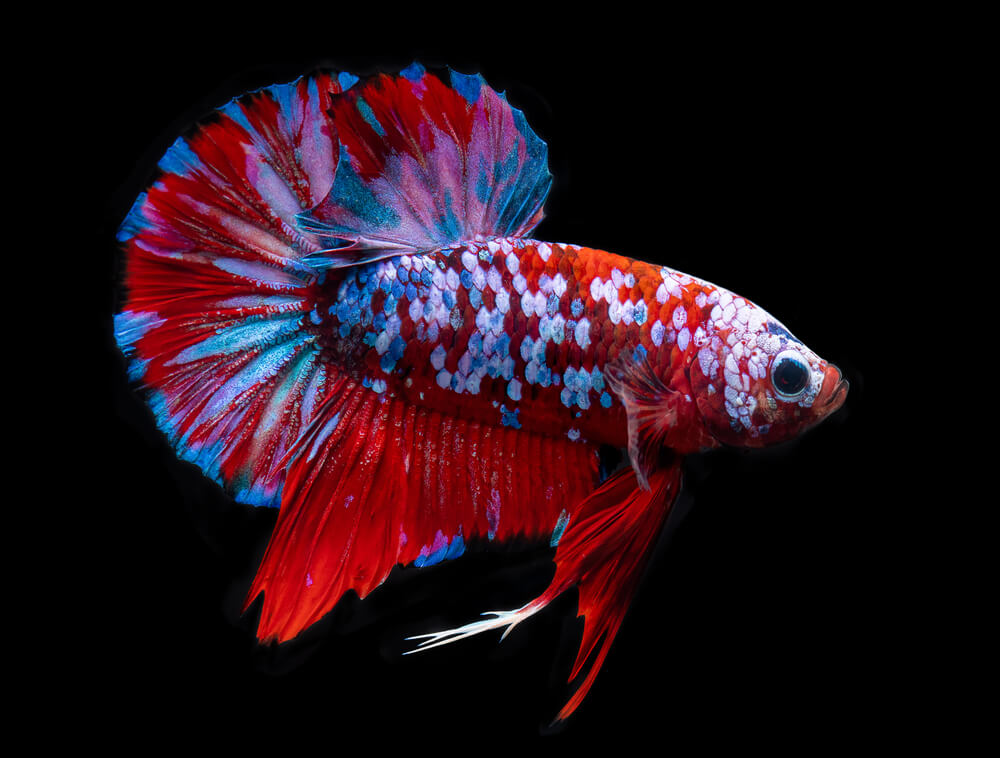
Conclusion
Betta fish need restful sleep just like we do, and it’s important to create the right environment for them.
Ensuring that your betta has a peaceful place to sleep can help them stay healthy and happy. With adequate rest time each day, they’ll be more active and vibrant when awake.
To ensure quality sleep, remember: keep their tank clean, provide plenty of hiding places, maintain comfortable water temperatures, and avoid unnecessary light or noise disturbances in their space.
By taking these steps to make sure they get the rest they need, you’ll enjoy many years of interaction with your betta friend!
